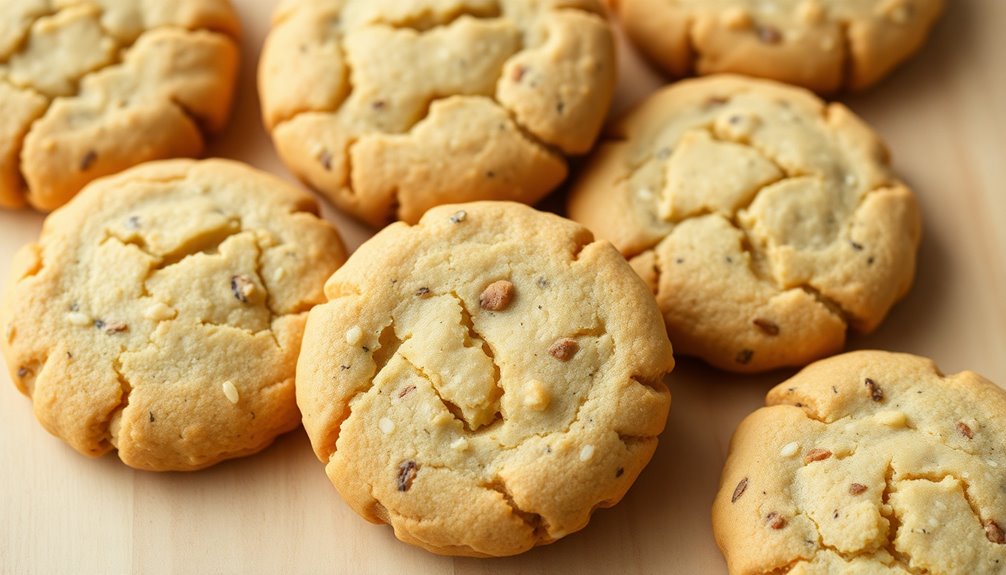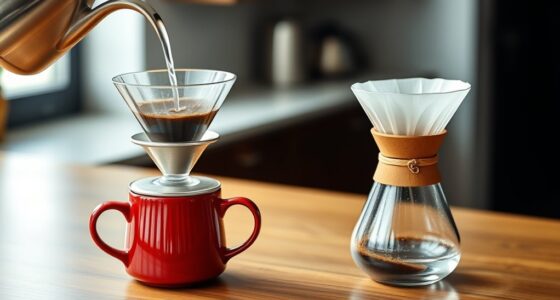In a cup of regular brewed coffee, you'll find about 80 to 100 mg of caffeine, giving you that essential boost to start your day. Factors like the type of coffee beans and brewing method can influence this amount. If you're sipping a larger cup or choosing a brand like Starbucks or Dunkin', the caffeine content can rise considerably. Remember, moderation is key; the FDA suggests up to 400 mg of caffeine a day is safe for most adults. If you're curious about how to manage your intake or explore alternatives, there's more to discover.
Key Takeaways
- A standard 8 oz cup of regular brewed coffee contains 80-100 mg of caffeine.
- Caffeine content can vary based on coffee bean type and brewing method used.
- Lighter roasts tend to retain slightly more caffeine than darker roasts.
- Larger serving sizes will increase the total caffeine intake per cup.
- Individual sensitivity to caffeine can affect how one experiences its effects.
Caffeine Content Overview
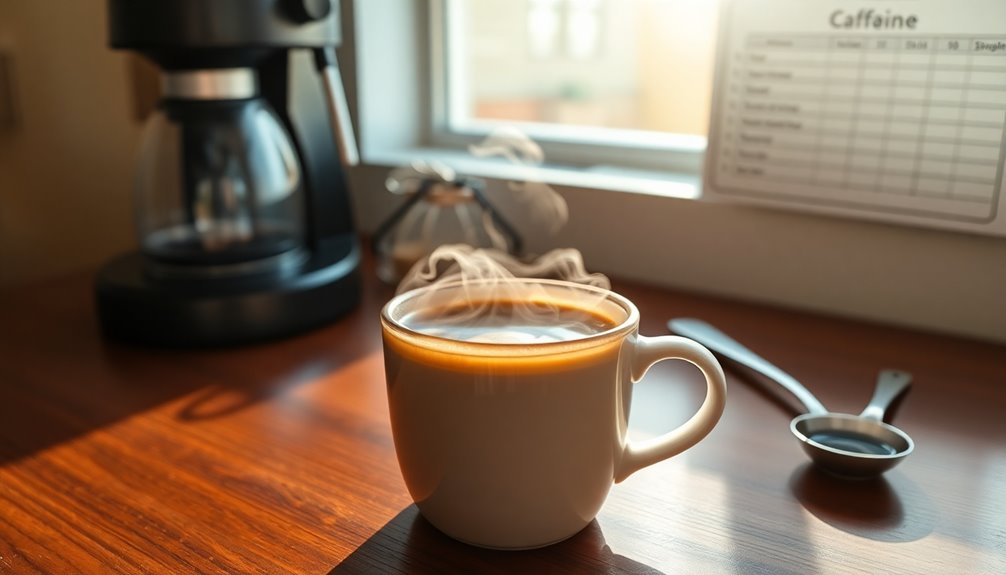
When you brew an 8-ounce cup of regular coffee, you're likely getting between 80 and 100 mg of caffeine. This caffeine content can vary based on several factors.
For instance, cold brew coffee packs a punch, averaging 153-238 mg in a 12-ounce serving. Instant coffee usually has around 62 mg per 8-ounce cup, while decaffeinated coffee contains only about 2-5 mg.
Commercial brands can also differ widely; for example, Dunkin' Donuts' medium brewed coffee has about 210 mg, while Starbucks Pike Place roast delivers approximately 310 mg in a 16-ounce cup.
Factors such as roast type, grind size, and brewing time all play a role in determining the final caffeine concentration in your cup of coffee.
Factors Influencing Caffeine Levels
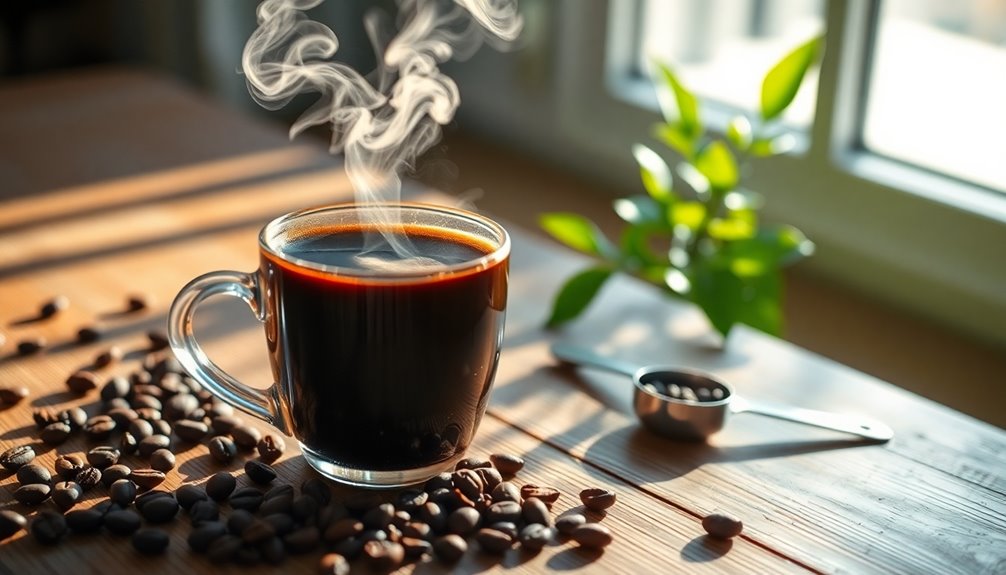
Several key factors influence the caffeine levels in your cup of coffee, impacting how much stimulation you get from each sip.
The type of coffee beans plays a significant role; Robusta beans contain about 2.2% caffeine, while Arabica beans have around 1.2%.
The roasting process also affects caffeine content, with lighter roasts generally retaining more caffeine than darker ones.
Your brewing method is essential too; methods like French press and cold brew often yield higher caffeine levels than drip brewing.
Additionally, serving size directly correlates with your total caffeine intake—larger cups or multiple shots ramp up the caffeine.
Finally, grind size matters; finer grounds enhance caffeine extraction, exposing more surface area to water during brewing.
Moreover, studies suggest that coffee's health benefits may further motivate individuals to choose higher caffeine options for enhanced performance.
Types of Coffee and Their Caffeine
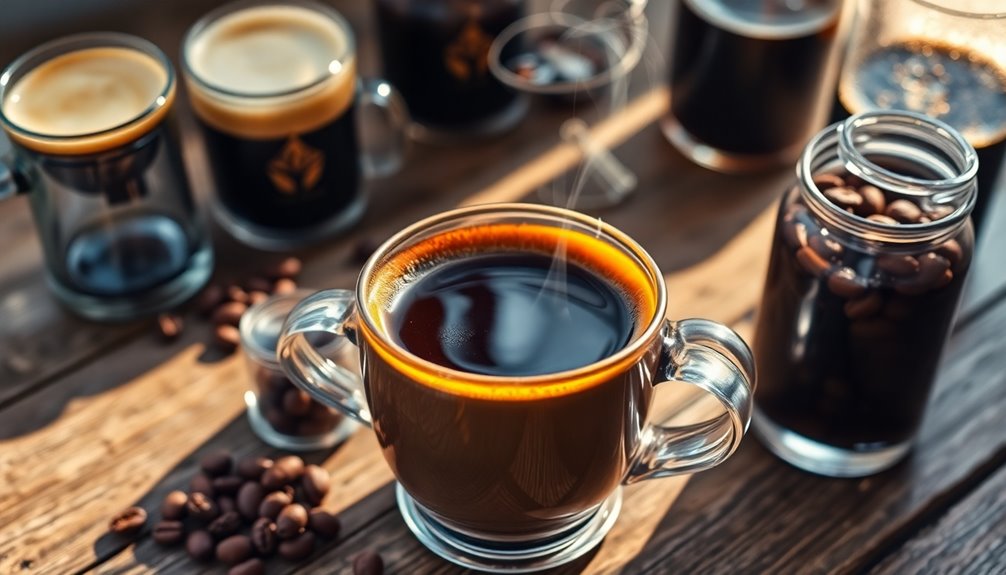
Coffee comes in various types, each with its own unique caffeine content. A standard 8-ounce cup of brewed coffee typically contains 80-100 mg of caffeine, depending on the brewing method and coffee beans used. Coffee drinkers who are looking to reduce their caffeine intake may opt for decaffeinated coffee, which contains only a small amount of caffeine, usually around 2-5 mg per 8-ounce cup. It’s important for individuals to be aware of how much caffeine in coffee they are consuming, especially if they are sensitive to its effects or trying to limit their intake. Understanding the caffeine content of different types of coffee can help coffee drinkers make informed choices about their consumption.
If you're looking for a stronger option, an ounce of espresso packs about 63 mg of caffeine, making it more concentrated by volume.
Decaf coffee, on the other hand, retains about 2-5 mg of caffeine per 8-ounce serving.
For those who enjoy cold brew, expect a higher caffeine content, averaging 153-238 mg per 12-ounce cup due to its longer steeping time.
Instant coffee contains around 62 mg of caffeine per 8-ounce cup, offering a moderate caffeine boost while being lower than brewed coffee.
Coffee Brands and Caffeine Comparison
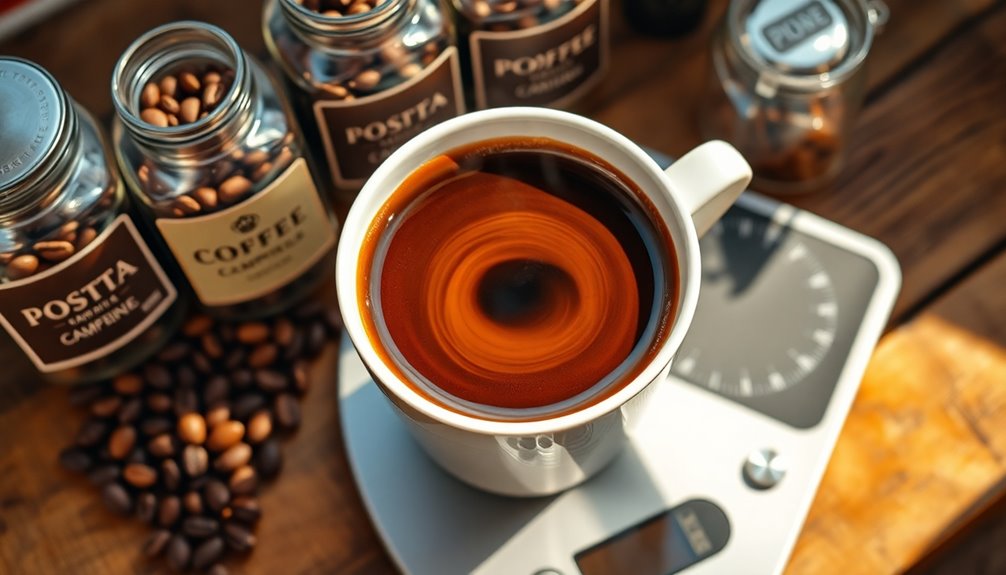
When you compare popular coffee brands, you'll notice significant differences in caffeine content.
For instance, Starbucks packs a punch with its Pike Place roast, while McDonald's coffee is on the lighter side.
Plus, if you're considering espresso or cold brews, those choices can really change your caffeine game.
Popular Coffee Brand Caffeine
If you're curious about caffeine content in popular coffee brands, you'll find significant variations that can impact your daily intake.
For instance, a 16-ounce brewed coffee from Starbucks, like the Pike Place roast, packs around 310 mg of caffeine, making it one of the highest caffeine options.
In contrast, Dunkin Donuts' medium (14 oz) coffee contains about 210 mg, while their iced coffee can reach up to 297 mg.
McDonald’s estimated 16-ounce coffee has around 145 mg of caffeine, though specifics aren’t publicly disclosed. Additionally, their 8-ounce cappuccino has approximately 75 mg of caffeine, making it a lower caffeine option for those looking to limit their intake. The cappuccino caffeine content at McDonald’s may vary slightly depending on the specific brewing process and serving size, but it generally falls within this range. Overall, customers can enjoy a variety of caffeinated beverages at McDonald’s to suit their individual preferences and caffeine tolerance levels.
If you're looking for a concentrated option, Dunkin Donuts espresso shots deliver roughly 118 mg per shot.
Brewed vs. Espresso Caffeine
Understanding the caffeine content in different coffee types helps you make informed choices about your daily intake.
An 8-ounce cup of brewed coffee typically contains between 80-100 mg of caffeine, while a single 1-ounce shot of espresso contains about 63 mg.
If you're considering popular brands, Starbucks offers a 16-ounce Pike Place roast with approximately 310 mg, and Dunkin Donuts' medium brewed coffee (14 oz) has around 210 mg.
It's important to note that caffeine amounts can vary considerably among brands. For instance, Starbucks' grande brewed coffee can have about 330 mg.
Cold Brew Comparison
Many coffee lovers are turning to cold brew for its smooth flavor and higher caffeine content. Cold brew typically packs a caffeine punch, with 153–238 mg per 12-ounce cup, far surpassing regular coffee's 80–100 mg in an 8-ounce serving. Popular brands like Starbucks and Dunkin Donuts lead the way in caffeine offerings. Check out the comparison below:
| Brand | Caffeine Content (mg) per 16 oz |
|---|---|
| Starbucks Nitro Cold Brew | 280 |
| Dunkin Donuts Cold Brew | 300 |
| Regular Brew | 80-100 |
| Cold Brew Average | 153-238 |
The brewing method enhances caffeine extraction, making cold brew a go-to choice for those seeking a jolt. Always check the nutritional information for specific products!
Health Implications of Caffeine

When it comes to caffeine, knowing the right balance is vital for your health.
While moderate intake up to 400 mg a day can be beneficial, exceeding that can lead to unwanted side effects like anxiety and insomnia.
It's important to understand your individual tolerance to avoid overstimulation.
Safe Consumption Levels
How much caffeine is safe for you?
The FDA suggests that healthy adults can safely consume up to 400 mg of caffeine daily, which is roughly four 8-ounce cups of brewed coffee.
Pregnant or nursing? It's best to limit your caffeine intake to 200 mg to protect fetal development.
For adolescents aged 12-18, the American Academy of Pediatrics recommends a maximum of 100 mg daily due to their developing bodies.
Be cautious of excessive caffeine consumption, as going over 500 mg can lead to side effects like increased heart rate, anxiety, and insomnia.
Remember, individual sensitivity varies; some may experience negative effects at lower doses.
Stay aware of your body's response to caffeine to maintain safe consumption levels.
Excessive Intake Effects
While caffeine can enhance alertness and focus, excessive intake can have significant health implications. Consuming more than 400 mg of caffeine daily—about four cups of regular coffee—can lead to adverse effects such as increased heart rate, anxiety, and insomnia.
If your daily caffeine intake exceeds 500 mg, you might also face dehydration and gastrointestinal issues, especially when combined with alcohol.
It's crucial to recognize that individual sensitivity varies; some people may experience negative effects at lower levels. If you suddenly cut back on caffeine, you could experience withdrawal symptoms like headaches, fatigue, and irritability.
Additionally, certain health conditions, such as GERD and epilepsy, may require you to completely avoid caffeine to prevent exacerbating symptoms.
Caffeine in Decaffeinated Coffee
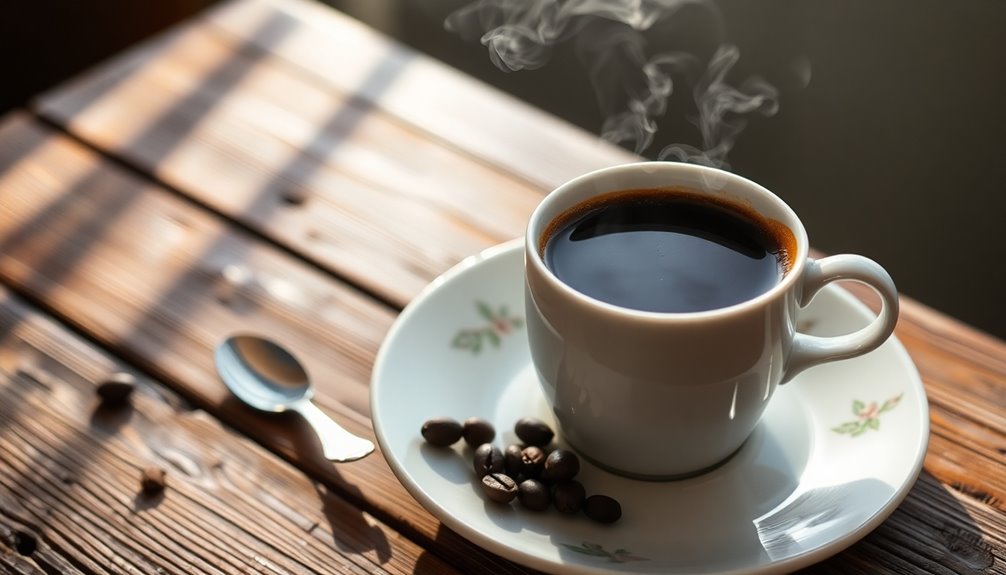
Many people are surprised to learn that decaffeinated coffee isn't completely caffeine-free.
In fact, an 8-ounce cup of decaf typically contains about 2-5 mg of caffeine, with many averaging around 2-4 mg. The decaffeination process removes approximately 95% of the caffeine from the original coffee beans, but some coffee brands may have slightly higher caffeine levels, reaching up to 15 mg per cup.
The caffeine content can vary depending on the types of beans used and the method of decaffeination.
Despite its low caffeine levels, decaf still offers many of the health benefits associated with regular coffee consumption.
Tips for Managing Caffeine Intake
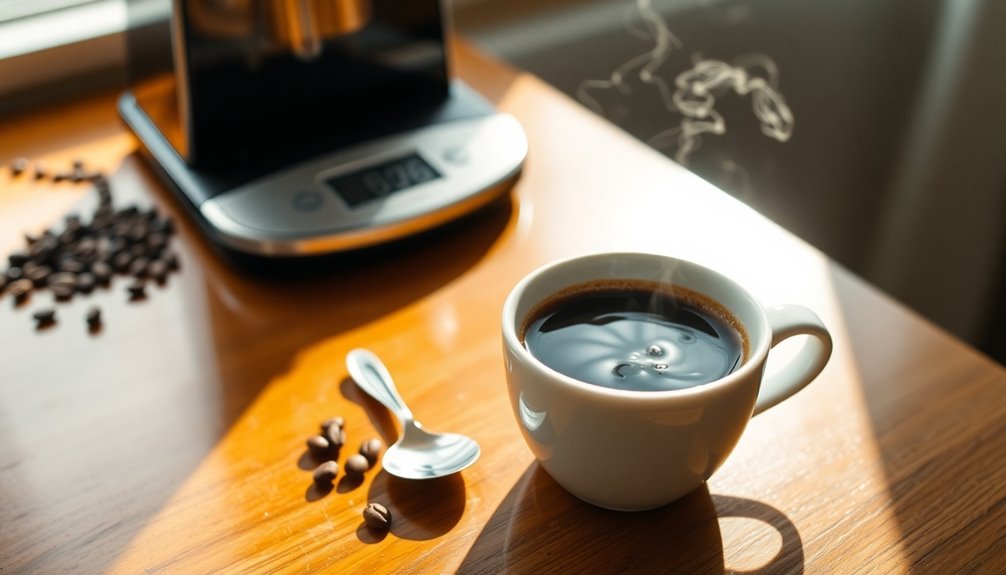
Are you feeling overwhelmed by caffeine? To manage your caffeine intake effectively, aim for no more than 400 mg per day to avoid adverse effects like anxiety or insomnia.
Start by monitoring your daily consumption and be mindful of serving sizes; an 8-ounce cup of regularly brewed coffee usually contains 80-100 mg of caffeine. If you're sensitive, consider switching to decaf coffee, which has only 2-5 mg per 8-ounce serving.
Choosing lighter roast coffees can also help, as they retain slightly more caffeine. To stay on track, use caffeine tracking apps or keep a journal to log your intake from coffee, tea, and energy drinks.
This way, you can enjoy your favorites without going overboard.
Frequently Asked Questions
Is 200MG of Caffeine a Lot?
Whether 200 mg of caffeine is a lot really depends on you.
For most healthy adults, it's a moderate amount and well below the FDA's daily limit of 400 mg. However, if you're a teenager or pregnant, it's considered excessive.
You might also find it too much if you're sensitive to caffeine, as it could cause jitters or insomnia.
It's important to listen to your body and adjust your intake accordingly.
How Much Caffeine Is in a 12 Oz Cup of Black Coffee?
When you pour yourself a 12-ounce cup of black coffee, you're diving into a world of caffeine!
Typically, you'll find between 113 to 238 mg of caffeine, with an average around 150.5 mg. This can change based on the brewing method, type of beans, and grind size.
If you opt for cold brew, you might even sip on 153 to 238 mg!
How Much Caffeine Is in Starbucks Coffee?
When you grab a Starbucks coffee, you can expect varying caffeine levels.
A 16-ounce cup of Pike Place Roast packs about 310 mg, while the Blonde Roast has around 360 mg, making it the strongest option.
If you prefer dark roasts, the brewed dark roast contains about 260 mg.
For espresso lovers, each shot delivers roughly 75 mg.
Even decaf has some kick, with about 25 mg in a decaf Pike Place.
How Much Caffeine Is in a Coke?
Imagine a revitalizing sip of cola on a hot day, the fizz bubbling with energy.
When you pop open a standard 12-ounce can of Coca-Cola, you're getting about 34 mg of caffeine.
If you prefer Diet Coke, you'll find a bit more zing at 46 mg.
Coca-Cola Zero Sugar matches the regular Coke's caffeine content, keeping your revitalization light while giving you a gentle boost without overwhelming your senses.
Conclusion
In summary, understanding caffeine content is essential for your daily routine. With factors like brewing time and coffee type affecting how much you consume, it's easy to feel like you're juggling a thousand cups just to stay energized. Remember, moderation is key to enjoying coffee without the jitters. Whether you're sipping a robust brew or a decaf, being mindful of your caffeine intake can help you stay balanced and alert throughout your day!

